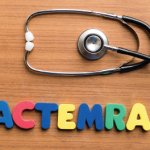
ajt/shutterstock.com
New RA Antibody Treatment
SAN DIEGO—A recent study examined the pharmacokinetics, safety and efficacy of E6011, an anti-fractalkine monoclonal antibody designed to treat rheumatoid arthritis (RA).1 Researchers presented the results of this first 52-week trial of E6011 at the 2017 ACR/ARHP Annual Meeting in November. Fractalkine (CX3CL1/FKN) is a chemokine that regulates chemotaxis and adhesion of CX3C chemokine receptor 1 (CXCR1)-expressing inflammatory cells.
During the study’s treatment phase, Japanese patients with active RA who had an inadequate response or intolerance to methotrexate or tumor necrosis factor-alpha inhibitors received E6011 at Weeks 0, 1 and 2, and every two weeks thereafter for up to 10 weeks. Patients received 100 mg (n=12), 200 mg (n=15) or 400 mg (n=10) doses.
If the agent showed no safety concerns, patients who had a greater than 20% improvement in both tender and swollen joint counts were given the option to receive an additional 20 biweekly treatments at the same dose in an extension phase. Of these 37 patients, 11 patients treated with 100 mg, 11 patients treated with 200 mg and 6 patients treated with 400 mg entered the extension phase, which lasted 52 weeks.
Repeated doses of E6011 were safe and well tolerated during the extension phase. The steady-state drug dosing for E6011 was attained at Week 2 and maintained through Week 52. At Week 12, ACR20 responses were achieved by 75% of 100 mg-treated patients, 80% of 200 mg-treated patients and 70% of 400 mg-treated patients. At Week 52, which was the last observation carried forward, the ACR20 responses included 58% of 100 mg-treated patients, 73% of 200 mg-treated patients and 60% of 400 mg-treated patients.
The incidence of adverse events was 84%, the incidence of treatment-related adverse events was 49%, and the incidence of serious adverse events was 14%. No deaths were reported during the study, and no differences between the groups were observed in the incidence or severity of adverse events.
Due to the positive results of this trial, E6011 will be studied in a Phase 2 trial designed to determine its optimal clinical dosing, as well as to further characterize its safety and efficacy in a placebo-controlled, double-blinded setting.
E6011 will be studied in a Phase 2 trial designed to determine its optimal clinical dosing, as well as to further characterize its safety & efficacy in a placebo-controlled, double-blinded setting.
Tocilizumab Monotherapy
SAN DIEGO—A recent study presented at the 2017 ACR/ARHP Annual Meeting in November evaluated the sustained response of RA patients treated with subcutaneous tocilizumab following the discontinuation of methotrexate. This randomized, controlled trial examined whether tocilizumab monotherapy was non-inferior to tocilizumab plus methotrexate in maintaining a clinical response in RA patients who had achieved low disease activity while taking tocilizumab plus methotrexate during a prior trial known as COMP-ACT.2



